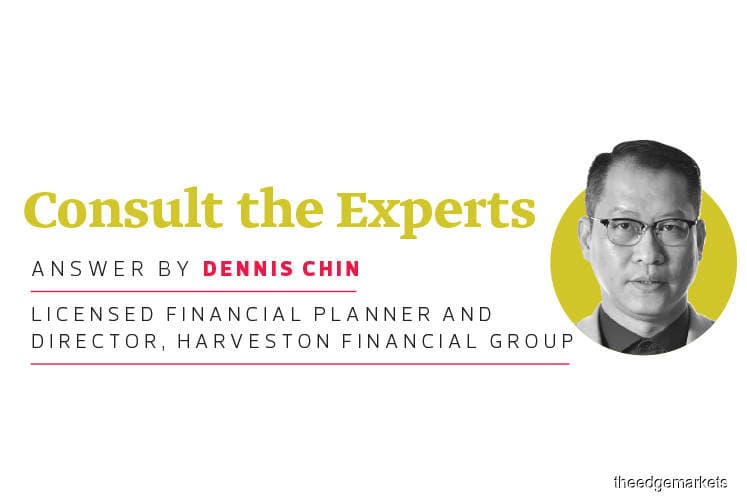
This article first appeared in Personal Wealth, The Edge Malaysia Weekly on April 6, 2020 - April 12, 2020
Questions: I am an unmarried 27-year-old office worker earning a monthly gross salary of RM6,000. My only financial commitment is a mortgage, with a monthly instalment of RM1,900. I have a three-month emergency fund — RM30,000 in fixed deposits.
I am planning to buy a brand new RM60,000 car, using a hire purchase loan and a 10% down payment from my emergency fund. My friends say I should take a five-year loan and pay it off as soon as possible to reduce the amount of interest paid.
However, I am considering a nine-year fixed-rate loan to take advantage of the current low interest rate environment. With the lower monthly instalments, I am thinking of using the extra cash to invest in financial products such as unit trusts or exchange-traded funds (via a robo-advisor).
I like having the extra cash for flexibility. But are there any better products out there? Or should I follow my friends’ advice instead? Thank you very much. > John, via email
Anwers: First, I would like to highlight the effective interest rate (EIR) of a hire purchase loan that comes with a flat interest rate. Yes, we are in a low interest rate era. However, you need to understand the impact of the EIR on your finances before deciding on your loan.
Let’s say the interest rate for a typical hire purchase loan in Malaysia is 3%. For a RM54,000 loan with a five-year tenure, the monthly instalment is RM1,035 and the EIR is actually 5.64% instead of 3%.
The same goes for a nine-year loan with a monthly instalment of RM635, which translates into an EIR of 5.50%. Therefore, a longer loan tenure incurs RM6,480 in extra interest over nine years.
A longer loan tenure with lower instalment amounts does provide you with extra cash flow for investment. However, this may not be feasible after the warranty period of the car because repair and maintenance costs will have increased by then. After the warranty period, the monthly instalments remain. But you will need extra cash for repairs and maintenance.
It is only worth investing the extra cash throughout the longer loan tenure if your investment returns are guaranteed to be more than 5.50%. That is because the interest rate for the loan is fixed throughout the tenure, but investment returns may vary. Bear in mind that the returns will also have to compensate for the additional interest incurred of RM6,480.
It is good to have an emergency fund that can cover at least three to six months’ worth of expenses. After utilising RM6,000 for the deposit of the new car, you will only have RM24,000 left in your emergency fund.
If your mortgage is a flexi-loan, whereby the amount can be withdrawn freely in the event of an emergency, I would recommend that you place the emergency fund into the loan account for your mortgage to reduce the interest rate because the interest rates of loans are always higher than those of fixed deposits.
Should you take a nine-year loan, you will have an extra RM400 a month to invest. Unit trusts would be the most feasible in this scenario because if you have already invested in a fund, the minimum additional investment amount is RM100, which you can make on a monthly basis. Other types of investments require more capital for diversification, which is not ideal with your limited cash flow. Robo-advisory platforms may be feasible if the minimum investment amount meets your monthly allocation.
When considering asset classes, you have to revisit your investment objectives, the tenure of the investments and your risk profile. However, based on your current circumstances, you should not invest in instruments with excessive risk and low liquidity. In fact, your mortgage and the monthly instalments for the hire purchase will take up almost 50% of your gross salary.
In a nutshell, we need to be prudent in our financial planning. So, it is advisable to take a five-year loan and have a vehicle warranty period of five years to match. In your situation, after taking into account your living expenses and other commitments, if you find that you do not have enough cash, you should consider buying a cheaper car.
Finally, you should ensure that you have medical coverage, either through your employment or a personal insurance plan. Otherwise, a sudden illness that requires hospitalisation will jeopardise your entire financial plan.
Have a personal finance query? Send it to: Consult the Experts, Personal Wealth, Level 3, Menara KLK, No 1, Jalan PJU7/6, Mutiara Damansara, 47810 Petaling Jaya, Selangor; Fax: (03) 7721 8018; email: [email protected], Attn: Consult the Experts. Please include your full name, address, contact number and pseudonym, if any.
Save by subscribing to us for your print and/or digital copy.
P/S: The Edge is also available on Apple's AppStore and Androids' Google Play.